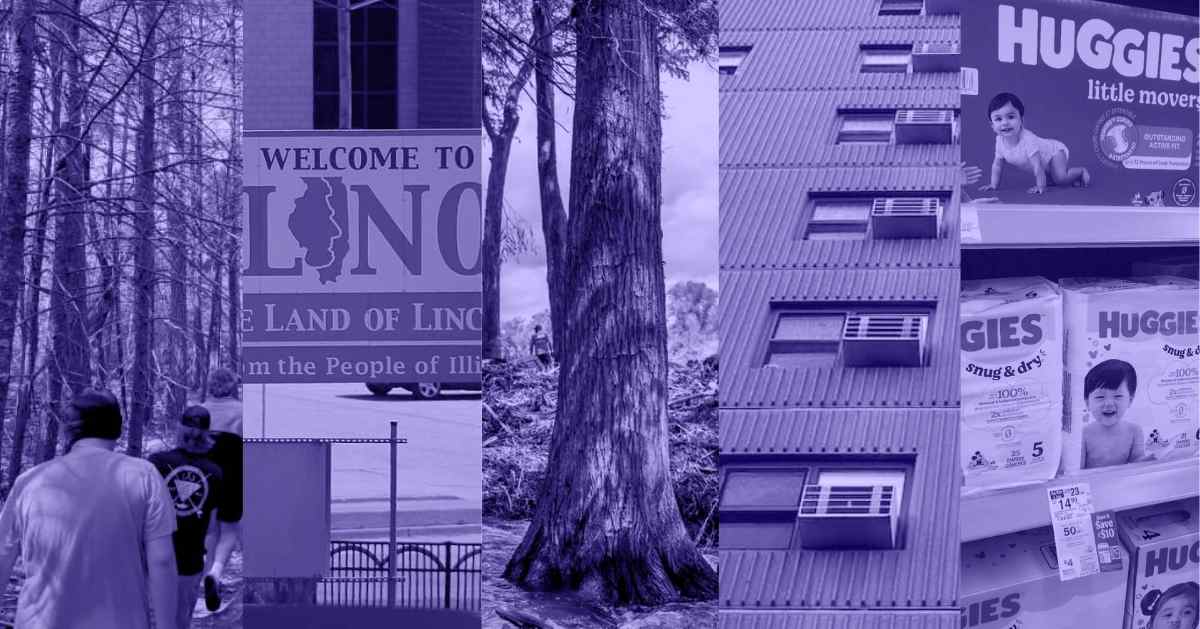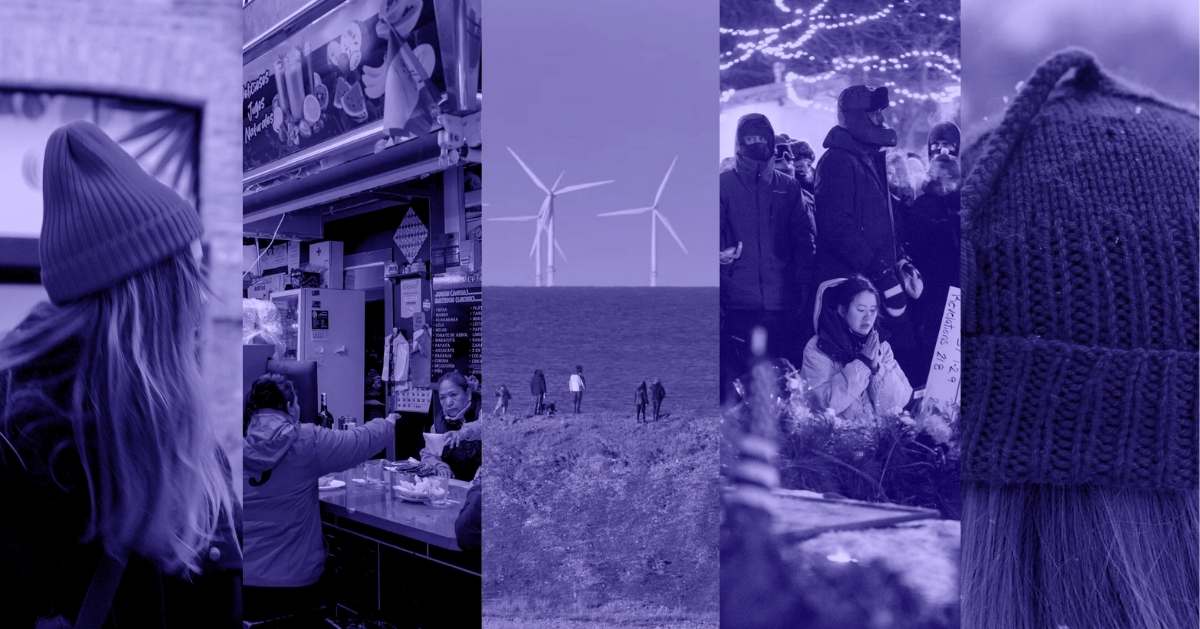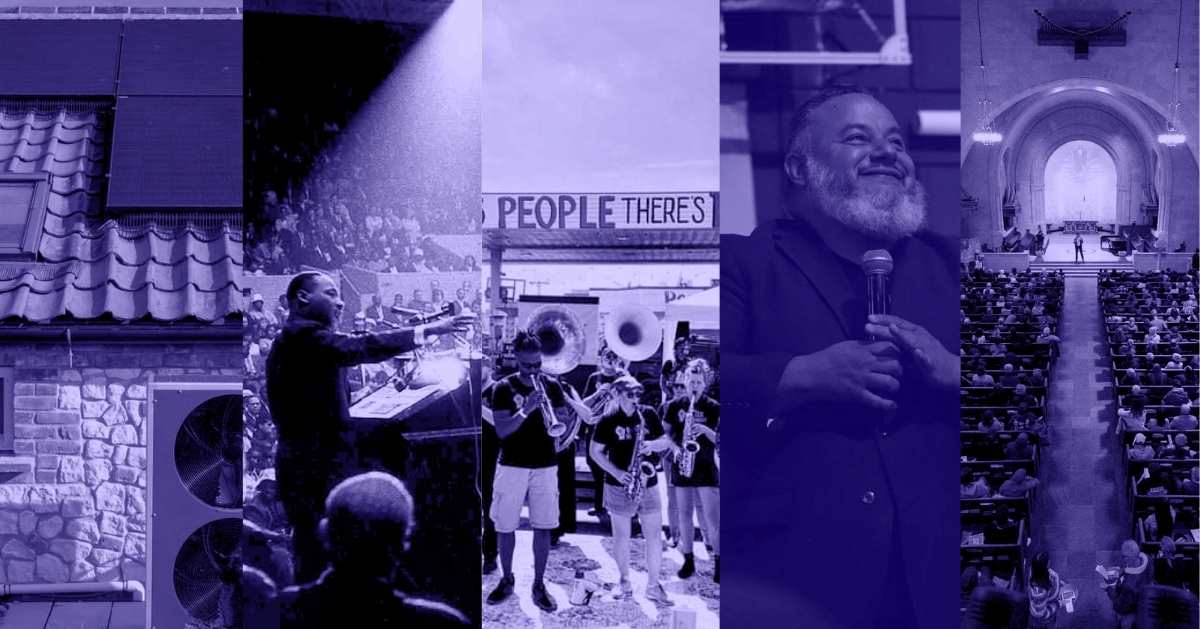Every day the Good Good Good team collects the best good news in the world and shares it with our community. Here are the highlights for this week!
If you want to get good news in your inbox every day, join the Goodnewsletter — the free daily newsletter designed to leave you feeling hopeful.
The Best Positive News We’re Celebrating This Week —
Students in a Maine school district are choosing to go on a hike instead of to traditional detention
Alternatives to traditional detention — sitting in a room monitored by a teacher — exist, including some restorative task or community service. But one school counselor at a high school in Maine is piloting a program that gets kids in nature, instead.
Leslie Trundy started the program after attending an outdoor education conference, where she wondered whether spending time outdoors might encourage the kids to open up about the problems they might be experiencing.
While she doesn’t have enough data yet to determine if it’s a “success” as some may define it — though students report fewer detentions and the hikes helping give them the time space to reflect that they couldn’t “just sitting in a classroom” — Trundy said it has led to some students joining her outdoor outing club for fun.
Why is this good news? Spending time in nature has been shown to improve human health and well-being. And while consequences for mistakes or wrongdoing are also a natural part of life, ones like this can actually help address the problem better than simply sitting in a quiet classroom.
→ Read more
1,000 dogs volunteer for first-ever ‘canine-citizen science’ study, sniffing out invasive species
→ Read more
An LA County program is successfully reducing the number of people living on the streets and in shelters
Launched in 2021, LA County’s Homelessness Prevention Unit uses artificial intelligence to analyze government data for signs someone is at high risk of falling into homelessness, like frequent hospitalizations, psychiatric holds, and more.
Outreach workers contact them to provide assistance with staying housed, like paying overdue rent, signing up for mental health treatment, or fixing their car to get to work.
Now, a study has shown that the pilot phase of the county’s program found that people enrolled in the prevention program were 71% less likely to end up in a shelter or on the streets compared to those who were not enrolled.
Despite the national extension shutting down, Illinois is keeping its dedicated 988 lifeline for LGBTQ+ youth
The 988 suicide and crisis lifeline was launched nationwide in 2022, along with a network of trained crisis counselors to specifically offer support for LGBTQ+ people 25 and under, a group of people disproportionately at risk for suicide and mental heath struggles.
While the U.S. government cut its funding, shutting down the service nationally, but Illinois has promised to keep its line open and continue providing mental health support services for LGBTQ+ young people. Currently it gets more than 1,600 calls and 600 chats every month.
The state is also working to expand its LGBTQ+ youth-specific counselor training, make sure call centers are well resourced, and continuing to advertise the lifeline.
Why is this good news? Suicide is the second leading cause of death for young people between ages 10-14, and the third leading cause among 15- to 24-year-olds. Among LGBTQ+ youth, the likelihood of suicide attempts is quadruple that of their peers — if they have support, it can be life-saving.
New study shows dogs help people regulate stress even more than expected: ‘Profound implications for human health’
→ Read more
Tree planting in England is now at its highest recorded rate in over 20 years
In the past year, 5,765 hectares of new woodland were established across England, a 27% higher rate than in 2023-2024, and 156% higher than in 2022-2022.
Another 880,000 trees were planted outside of woodland areas, bringing the total area of new tree canopy to 7,164 hectares and 10.4 million trees — an area equivalent to 10,000 soccer fields.
This milestone is part of larger nationwide goal to increase woodland cover to 16.5% of England’s total land area by 2050 — and the government says progress is thanks to a myriad of partners, communities, and individuals.
→ Read more
Volunteers came from all over the state to help a Texas summer camp for disabled people reopen to welcome campers
Located just 30 miles downstream from Camp Mystic, where the Texas floods killed 27 campers and counselors, is Camp Camp, which offers sleep-away camps every summer for children and adults from five to 55 years old with mild to severe disabilities.
Offering similar camp activities like horseback riding, swimming, archery, and more, Camp Camp’s 55-acre property was also devastated by the floods.
One day after an Austin real estate agent made a plea on Facebook for “money, manpower, and machines” to help rehabilitate the camp, 250 volunteers arrived to help — and 500 came just two days later. Some reported there being as many as 1,500 people there to help.
Why is this good news? Camp Camp welcomes more than 800 campers each summer and has a 1:1 counselor ratio to accommodate each person’s needs. While the area is still devastated and recovering from the deadly floods, these hundreds of volunteers knew how important it was to get this camp back into shape to welcome guests to experience some normalcy and joy.
→ Read more
Homicide rates hit ‘record lows’ in these major cities, following broader trend in the US
→ Read more
A Kentucky ‘River Cowboy’ has spent decades pulling thousands of improperly discarded tires from waterways
Every year, the U.S. discards nearly 300 million tires, and while most are reused or recycled, millions are unaccounted for — 1 million in Kentucky alone — and they end up in waterways like the Red River.
That’s where Russ Miller and his wife have lived for decades, both enjoying kayaking in the scenic waterways — and cleaning them up. After seeing a tire speared to a tree “like an olive on a toothpick,” he realized it would be there forever (or at least thousands of years) unless someone did something.
So that’s what he did. And for the past several decades, Miller has cleared an estimated 3,000 to 4,000 tires from Kentucky’s waterways. He’s also a founding member of the grassroots cleanup group Friends of Red River, formed in 1996.
→ Read more
When a heat wave hit New England, solar panels and batteries prevented a blackout and saved people millions of dollars
At the end of June, a heat wave sent temperatures soaring above 100 degrees Fahrenheit in New England — but a network of solar panels and batteries kept power on, reduced fossil fuel consumption, and saved consumers an estimated $20 million.
High temperatures led to grid demand reaching maximum capacity, and while traditional methods to resolve that — like importing energy from nearby areas, were implemented, new clean energy solutions were, too.
Rooftop and other “behind-the-meter” solar panel installations — which don’t pull from the grid — and a network of batteries provided several gigawatts of power, helping reduce grid pressure and saving customers millions of dollars total.
Why is this good news? Solar power and battery storage are proving themselves over and over again in their ability to make energy grids not only less carbon-intensive, but more resilient, adaptable, and affordable amidst extreme weather like heat waves — which are only growing more intense and frequent due to the climate crisis.
Three-footed turtle given ‘new wheels’ after museum staff gifts him a handmade LEGO harness
→ Read more
A first-of-its-kind study found that emergency vaccine rollouts have cut deaths by 60%
The first comprehensive study assessing the impact of emergency vaccination programs found that they reduced deaths by around 60% over a 23-year period, and prevented a similar number of infections.
The researchers believe that the rollouts stopped much bigger outbreaks of Ebola, measles, cholera, yellow fever, and meningitis.
Not only did they prevent loss of life, but they also resulted in significant economic benefits to the tune of $32 billion in averting deaths and years of life lost to disability. This could also be a significant underestimation, as it doesn’t count the cost of dealing with larger outbreaks.
For example, the 2014 Ebola outbreak — which happened before an approved vaccine — is estimated to have cost West African countries alone more than $53 billion.
Missouri became the latest state to end its ‘luxury tax’ on diapers and menstrual products
Missouri’s governor signed a bill eliminating the state’s “tampon tax” on menstrual products and diapers, reducing the state’s tax rate on the items from 4.225% on “luxury” goods to 1.225% on necessities, like groceries.
For diapers, there are health risks associated with having an inadequate number of diapers or diapers being worn too long.
And period poverty is still widespread in the U.S., with one in five teens unable to afford menstrual products, and 84% of teens have themselves or know someone who has missed school due to insufficient menstrual supplies.
Why does this matter? Diapers and menstrual products are necessities, not luxuries, and people shouldn’t pay more for them as a result of that improper designation. A 4.225% tax rate might not seem like a lot — but for families and people who are already struggling to afford basic necessities, it is. While Missouri should join other states that have repealed their tax entirely, this is important progress.
Homeless people given free cash with no strings attached in new study: ‘I will never not pay my bills’
There are now more than half a billion ‘mobile money’ accounts in the world, reducing a hurdle to escaping poverty
For more than a billion people in the world, cash is their only way to exchange money — and the absence of banking services hinders their ability to escape poverty.
Recently, “mobile money” has transformed how people can access financial services, differing from traditional bank accounts in that you don’t need a physical bank branch or even internet access. Instead, deposits, transfers, and payments happen via text message.
This gateway to the more formal, global banking system unlocks life-changing opportunities many of us take for granted, like the freedom to study or work where you want, borrow from friends or family in emergencies, and more.
More good news of the week —
Atlanta became the latest city to adopt a “cool roofs” program to combat urban heat. Experts say cool roofs are a simple, relatively cheap, and effective way to save people from extreme heat by significantly reducing temperatures not just in a building, but in the surrounding urban environment.
A shelter dog made history as the first-ever “morale dog” stationed on a US Navy ship. Adopted from Labs and More Rescue, Raider has been training to go to the bathroom on a “potty patch,” to wear booties to protect his feet from hot surfaces, to wear eye protection, and to get used to all the noises on the ship.
Various bird species are thriving and breeding in “astonishing” numbers in Germany's solar parks. Larks in particular are benefiting from the park’s features, like minimal visitors and vegetation kept short by sheep, whose droppings and varying flowering herbs provide food.
Addressing two major environmental problems, researchers turned food waste into biodegradable plastic. According to the U.S. Department of Agriculture, 30% to 40% of the nation’s food supply ends up being wasted, adding up to billions of pounds every year rotting in landfills and emitting greenhouse gases like methane and carbon dioxide.
Vendors at London’s iconic O2 arena went completely plant-based for Billie Eilish’s six-night concert run. The Grammy award-winning musician and activist headlined the 20,000-capacity arena adopted an entirely plant-based menu at Eilish’s request, just like it did back in 2022 for another tour.
Related: Billie Eilish pushes music labels to ‘upcycle’ 400,000 unsold T-shirts into new merch
Joining the “food as medicine” movement, New York City’s public hospitals are prescribing free boxes of fresh produce to patients. Since it started in August, more than 500 patients have enrolled in the Lifestyle Medicine Program’s produce box initiative, which delivers fresh produce to patients’ homes every month for six months.
California unveiled a new extreme heat ranking system to help people prepare and protect themselves from high temperatures. Similar to hurricane categories, the CalHeatScore system relies on a 0-to-4 ranking system, with zero indicating “no elevated community risk of heat-related illness” and four’s “severe” classification means extreme heat and significant risks of illness.
After a 150-year absence, a bandicoot “baby boom” in Australia is renewing hope for the endangered species. A reintroduction plan implemented by conservationists in 2023 is proving successful, with adult females in “breeding condition,” and 44 bandicoot younglings observed just a year later.
Portugal is now providing monthly paid menstrual leave for people with endometriosis or adenomyosis. Employees who experience severe and disabling pain caused by endometriosis or adenomyosis during their menstrual period are now entitled to employer-paid leave for up to three consecutive days per month of work.
Scientists invented a “living” concrete that heals its own cracks with sunlight. Despite being the most widely used building material on Earth, cracks in concrete — big or small — can lead to catastrophic structural issues, even leading to the collapse of a building, bridge, or highway.
Reducing AC use and carbon emissions, a new AI-designed roof paint can cool buildings by up to 36 degrees. The team of engineers leading the research estimates that the level of cooling could save the equivalent of 15,800 kilowatts per year in an apartment building in a hot climate, in addition to many other uses and applications.
Senegal joined a growing list of countries that have eliminated trachoma as a public health concern. A “sign of the remarkable progress being made against neglected tropical diseases globally,” trachoma has been known in Senegal since the early 1900s and was confirmed as a major cause of blindness through surveys in the 1980s and 1990s.
A K-pop boy band whose members are deaf or hard of hearing is incorporating sign language into their music. Big Ocean uses the latest audio technology to help make their music, coordinate their choreography with flashing metronomes and vibrating watches, and incorporate Korean Sign Language into videos and performances.
The largest independent bookshop in England is opening in a historic building. The company behind the bookshop, Topping & Company Booksellers, runs four other shops in the UK and has a track record of creating beautifully designed bookshops in historic settings.
Metal, concrete, and other materials from buildings burned in the LA fires are being recycled and given new life. The Army Corps of Engineers set up operations to compact metal and crush concrete, then take it in trucks to recycling facilities before re-entering the supply chain for future uses — it’s even repurposing trees and shrubs that made it through the fires.
A group of University of Connecticut students created a tool that simulates finding a tumor during a breast self-exam. The group was led by engineer Leslie Holton, who, 20 years prior, was a graduate student studying virtual reality in medicine when her mother died of metastatic breast cancer, leading her to want to develop this kind of detection tool.
New “Hero Gum” is making it easier than ever to find a match for people in need of a stem cell transplant. Every year, 20,000 Americans need a stem cell transplant, but only 30% find a match within their family — the other 70% rely on donor registries, one of which could dramatically expand its donor pool through this new, easy, accessible method that relies on a wad of chewed gum.
An anonymous donor gave $52,500 to help clear Colorado’s rape kit backlog. Sexual assault victims in Colorado wait 570 days on average for the state to process their evidence kits, leaving victims often unable to pursue criminal charges, restraining orders, or any semblance of justice.
The world’s largest solar mural turned an Alberta, Canada building into a massive power generator. The 34,500 square-foot mural was designed by an Indigenous artist, combining art with building-integrated photovoltaics that provide 267 kilowatts of solar capacity to power the residential building’s common areas.
A major health insurance company reduced around one-third of prior authorization requirements for certain health care services. Humana became the latest insurer to address the tedious paperwork process that has been a pain point for patients and providers, which can lead to delays in care and essential treatments.



